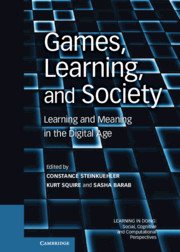Book contents
- Frontmatter
- Contents
- Contributors
- Series Foreword
- Foreword
- Acknowledgments
- Section I Games as Designed Experience
- Section II Games as Emergent Culture
- Section III Games as Twenty-First-Century Curriculum
- 17 Introduction to Section III
- 18 Prediction and Explanation as Design Mechanics in Conceptually Integrated Digital Games to Help Players Articulate the Tacit Understandings They Build through Game Play
- 19 Game-Based Curricula, Personal Engagement, and the Modern Prometheus Design Project
- 20 Discovering Familiar Places
- 21 Developing Gaming Fluencies with Scratch
- 22 “Freakin’ Hard”
- 23 Models of Situated Action
- Afterword Games and the Future of Education Research
- Index
Afterword - Games and the Future of Education Research
Published online by Cambridge University Press: 05 August 2012
- Frontmatter
- Contents
- Contributors
- Series Foreword
- Foreword
- Acknowledgments
- Section I Games as Designed Experience
- Section II Games as Emergent Culture
- Section III Games as Twenty-First-Century Curriculum
- 17 Introduction to Section III
- 18 Prediction and Explanation as Design Mechanics in Conceptually Integrated Digital Games to Help Players Articulate the Tacit Understandings They Build through Game Play
- 19 Game-Based Curricula, Personal Engagement, and the Modern Prometheus Design Project
- 20 Discovering Familiar Places
- 21 Developing Gaming Fluencies with Scratch
- 22 “Freakin’ Hard”
- 23 Models of Situated Action
- Afterword Games and the Future of Education Research
- Index
Summary
The games, learning, and society community is positioned to spark a revolution in education research. Video games emerged in the 1980s and 1990s as a radically new form of entertainment technology. Within a single generation, arcade and text-based adventure games evolved into first-person shooters, simulations of world history, and million-player massively multiplayer online worlds. Games proliferated on fast Internet connections and on mobile devices. It has taken a while for research communities to catch up. At first, much of the popular rhetoric on gaming focused on the risks and potential damage of gaming. Commentators issued cautionary tales that focused on deviance, distraction, and the potential for sparking antisocial behaviors and corrupting youth. Only recently has scholarly discussion begun to turn a corner to consider gaming as a powerful catalyst for learning.
Recent education research on games and gaming has struggled with self-definition. The potential of games to produce learning is no longer in much doubt. No one who has ever played, for example, Deus Ex, Civilization, or the Sims would question the power of immersive games as learning environments. The game environments are not only brilliant at scaffolding increasingly sophisticated play, but they also provide easy access to the tantalizing experience of world immersion. The interactive nature of gaming allows some players to actively participate in the direction and outcomes of narratives and others to create elaborate rule-based systems with emergent properties. The education research community, however, has been slow to embrace the revolutionary potential of games for learning. Instead of focusing on the unique affordances of game design and game play, many games researchers instead have focused on defining games in terms of existing education research agendas. At the beginning of this collection, Kurt Squire cites the refrain demanded of games researchers: “Where is the evidence that games work?” This question haunts video games and learning research. (How) Do games teach math? (How) Can games lead to careers in science? (How well) Can games teach students to read? It turned out that, in most cases, games proved neither as efficient nor as effective in reproducing the kinds of results characteristic of other kinds of instructional interventions. Thus the value of gaming as a new form of learning was stunted by the lack of evidence that games work as well as traditional methods to deliver traditional content.
- Type
- Chapter
- Information
- Games, Learning, and SocietyLearning and Meaning in the Digital Age, pp. 433 - 446Publisher: Cambridge University PressPrint publication year: 2012
- 1
- Cited by



